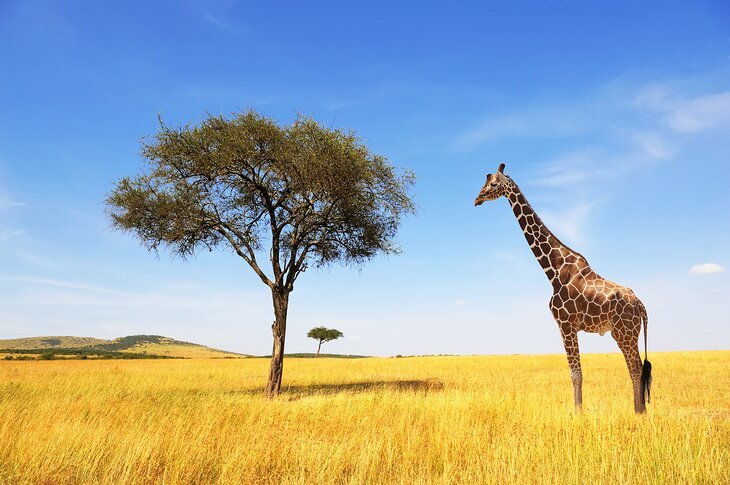
• Africa is the second largest continent and its area makes up about Africa 22% of the total land area.
• Including the disputed territory of Western Sahara and adjacent island states, there are 54 independent states in Africa.
• Africa's current population is about a billion people. Over the past forty years, there has been a real population explosion, and therefore the average age of the population on this continent is relatively low. In many African countries, half the population has not yet reached the age of 25.
• Africa is located most centrally in relation to the world coordinate system. It is crossed by both the prime meridian (0 degrees longitude) and the equator (0 degrees latitude).
• Although Africa's population represents about 16% percent of the world's population, a quarter of the languages on the planet are spoken only in Africa.
• Arabic, available in various dialects, is the most widely spoken language in Africa. The language's 170 million speakers live mostly in North Africa. In addition to Arabic, another 2,000 languages are spoken on the continent.
• Nigeria is the most populous country in Africa, with a population of up to 145 million people. The second most populous country, Egypt, is home to more than 76 million people.
• The most populous city in Africa is Cairo, the capital of Egypt. About 17 million people live in this metropolis.
• The largest country in Africa is Sudan. Its total territory is 2.5 million km². The smallest country in Africa is the Seychelles, whose territory is only 453 km².
• Demographers have determined that there are at least 3,000 distinct ethnic groups in Africa. There are over 370 tribes in Nigeria alone.
• The longest river in the world flows through Africa, its length is 6,650 kilometers.
• Africa's Lake Victoria is the second largest freshwater lake in the world, covering an area of 69,490 square kilometers.
• Africa is also home to the world's largest desert, the Sahara Desert, which covers a larger area than the entire continental United States.
• Egypt is the most attractive country for tourists in Africa mainly because of its pyramids. But few people know that Sudan has 223 of its own pyramids, which is twice as many as in Egypt. They are smaller and more flattering than their Egyptian “rivals”, and therefore not so popular.
• Four of the five fastest-footed animal species live in Africa: cheetah, wildebeest, lion and Thompson's antelope. All of them can run at speeds of more than 80 km/h, and the cheetah can reach speeds of up to 112 km/h.
• Africa is also home to the largest “land” animal. The African elephant can reach a weight of 6 to 7 tons.
• Africa is the poorest and most undeveloped continent despite its rich natural resources. The average poor person in non-Arab Africa lives on 70 cents a day.
• More than 17 million sub-Saharan Africans have died from AIDS, and experts believe there are at least 25 million people living there now living with HIV.
• About 90% of malaria cases occur in Africa, and 3,000 children die from it every day.
• Central East Africa is considered by many scientists to be the origin of both humans and great apes. The earliest remains of the species Homo sapiens were found in Ethiopia, and their approximate age is estimated at 200 thousand years.
• English scientist Charles Darwin was the first to suggest that the ancestors of human beings originated from Africa. However, prejudice against the inhabitants of this continent caused many people in the West to resist this idea until the 20th century.
• In 1974, the skeleton of “Lucy,” a humanoid creature that lived approximately 3.2 million years ago, was found in Ethiopia near Hadar and was identified as the common ancestor of humanity. In 1979, the oldest human footprints were found in the Kibish region of Tanzania. These two discoveries became irrefutable proof that humanity originated in northeast Africa.
• Before the emergence of Egyptian civilization, Africa was predominantly inhabited by tribes of hunter-gatherers who were not inclined to develop statehood. Scientists believe that the first experience of domesticating animals belongs to people who lived in Africa 6 thousand years BC, long before plants became domesticated here.
• The most ancient civilization that originated in Africa was the state of the pharaohs in ancient Egypt. It began approximately 3,300 BC and ended in 343 BC.
• Europeans first appeared on the northern coast of Africa around 332 BC, when Alexander the Great came to Egypt and founded the city of Alexandria. Soon after, the Roman Empire began to include the northern coast of Africa.
• There are several hypotheses regarding the origin of the word Africa, but most etymologists are inclined to believe that the first part of the word “Afri” is the name of a tribe that lived in North Africa, near Carthage in the 3rd century BC. And “-ka” is a Latin suffix meaning “country”, “land”.
• By the first century AD, Africa was divided into three parts: Egypt, Libya and Ethiopia. The name Ethiopia also applied to the rest of the continent, which was located south of the Sahara Desert.
